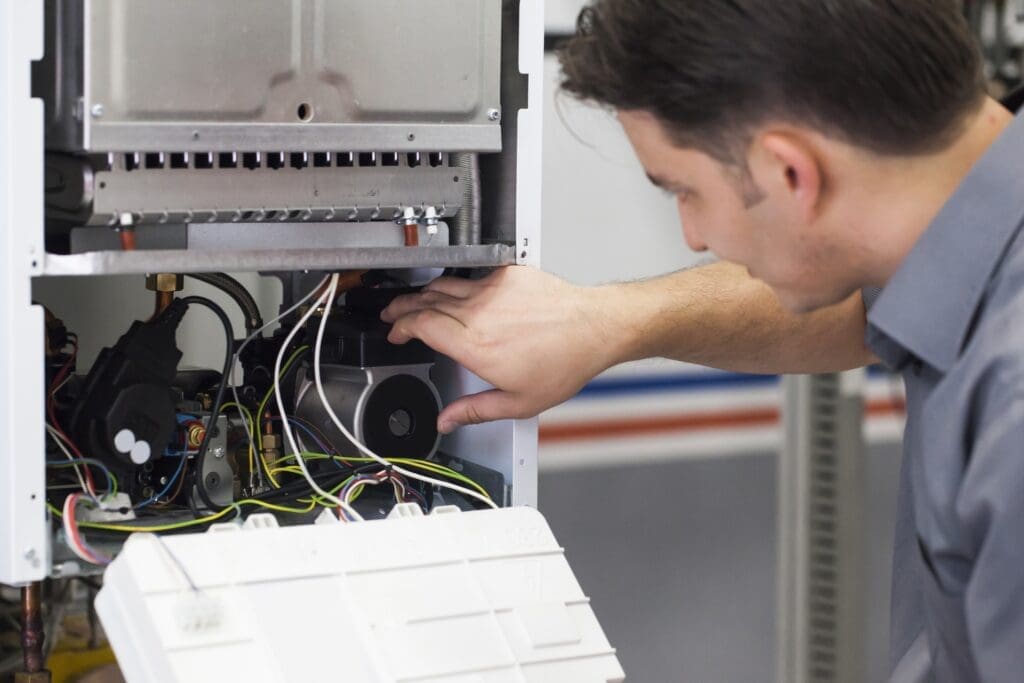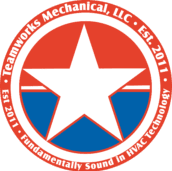No, Your Furnace Isn't a Comedian...It's Just Making Funny Noises
Furnace noises can be really annoying, but your furnace isn't trying to be funny—it's just making some weird sounds. These sounds can be screechy, rumbling, or even like whistling or banging. If you're hearing something strange, it's time to investigate. In this section, we'll talk about the different noises your furnace might make and how to figure out what they mean. Once you know where the noise is coming from, you're on your way to fixing the issue and having a quieter, calmer home. Let's get started!
1. Identifying the Noises
Screeching or Squealing Noises:
If your furnace is making screeching or squealing sounds, it's a sign that something might be wrong. These high-pitched noises are usually because of a worn-out belt or motor bearings. These parts can wear down over time, creating these irritating sounds. If you ignore them, they could lead to bigger issues with your furnace. The best thing to do is to contact a professional HVAC technician. They can figure out the problem and fix it so your furnace runs quietly again. Don't wait too long—call the experts and enjoy a peaceful home once more.
Rumbling or Banging Noises:
If your furnace is making rumbling or banging sounds, it's a sign of a problem you shouldn't ignore. These noises can be scary and might indicate a serious issue with your heating system. Rumbling sounds often happen because of a dirty burner, which can lead to unsafe combustion. Banging noises might mean there's a problem with the ignition system or debris buildup in the furnace.
Whatever the cause, it's really important to call a professional HVAC technician. They can check your furnace, find out what's wrong, and fix it. Ignoring these noises could lead to more damage or even dangerous situations. Don't wait – act now to keep your heating system safe and working well.
Whistling Noises:
If your furnace sounds like a tea kettle with its whistling noises, there's a reason behind it, and it's not magic. These sounds happen when there are air leaks in the ductwork or vents of your heating system. Air escaping through small openings creates that whistling noise, disrupting the usual airflow. To fix this, you need a professional HVAC technician to check for these leaks and seal them up. Once the leaks are gone, your home will be quiet and peaceful again, without the annoying whistling tunes.
Booming Noises:
If your furnace sounds like there's a mini-explosion happening, it's probably not as scary as it seems. These booming noises occur because of a delayed ignition. It means the gas in your furnace doesn't ignite immediately, causing a small explosion-like sound. Although it's usually not dangerous, it's smart to have a professional HVAC technician check your furnace. They can fix it, making your home peaceful again without these startling booms. Don't ignore the noise; get it checked and enjoy a quiet home.
Clicking Noises:
If your furnace is making clicking noises, it's important to take notice. These sounds might signal an issue with the electrical system, like a faulty relay or a loose connection. Even though it might not seem like a big problem, ignoring clicking noises can lead to more significant issues later. It's a good idea to have a professional HVAC technician check and fix your furnace. Addressing the clicking sounds promptly can ensure your heating system works safely and efficiently. Don't ignore the clicks; get them checked out and enjoy a quiet home again.
Rattling or Clanking Noises:
Hearing rattling or clanking noises from your furnace can be unsettling, like your heating system has turned into a musical instrument! These sounds might mean a loose or broken part inside your furnace, like a fan blade or a heat exchanger. Even though it might not seem like a big problem, ignoring these noises can lead to more damage and safety concerns. It's smart to have a professional HVAC technician check and fix your furnace. Dealing with these noises promptly can ensure your furnace works well and keeps your home peaceful. Don't let the rattles and clanks continue; have them fixed for a quiet home.

2. Resolving the Noises
Regular Maintenance:
Keeping your furnace quiet and efficient is easy with regular maintenance. Start by cleaning or changing your furnace filters often. This keeps the airflow right and stops dust from making noise. Also, add some oil to moving parts like the blower motor. This stops friction and noise. Check and tighten electrical connections to stop buzzing or humming sounds. Doing these simple tasks regularly will make sure your furnace runs quietly and saves you time and money in the long run.
Replace Worn-Out Parts:
Getting rid of furnace noises is important, especially if worn-out parts are causing the racket. Over time, things like belts or bearings can wear down, causing rattles or squeaks. If you think a worn-out part is the problem, replace it soon. This not only stops the noise but also keeps your furnace working well. By finding and changing these worn-out parts, your furnace will be quiet and dependable, keeping your home warm in winter. Remember, this step is crucial in fixing those pesky furnace noises.
Address Delayed Ignition:
When your furnace makes loud banging or booming sounds, it could be due to delayed ignition. This happens when gas ignites after a delay, causing a build-up of gas and a sudden explosion-like noise. Not only is this noise scary, but it can also be dangerous. To fix this, turn off the furnace and call a professional HVAC technician. They will check the furnace to find out why it's happening. It could be a dirty or broken ignition system or a problem with the gas valve. Ignoring delayed ignition can lead to bigger issues and is not safe.
Seal Air Leaks:
Furnace noise can be caused by air leaks, leading to annoying sounds like whistling or hissing. These noises not only disturb you but also make your furnace work harder, increasing energy bills. To fix this, check your ductwork for gaps and seal them using duct sealant or foil tape. Also, ensure furnace panels and doors are tightly sealed. By doing this, your furnace will operate quietly and efficiently, keeping you cozy during winter without the bothersome noises.
Clean Burners and Vents:
To keep your furnace quiet and efficient, it's important to clean the burners and vents regularly. Dust and debris can build up, causing airflow problems and noisy sounds. First, turn off the furnace and let it cool down. Remove the access panel and gently clean the burners using a soft brush or cloth. Make sure to clear away any buildup or debris. Check the vents for blockages like leaves or dirt, and clean them using a vacuum or brush. Cleaning the burners and vents helps your furnace work quietly and effectively, keeping your home warm and comfortable in winter.
Repair or Replace Faulty Components:
If your furnace is still noisy despite cleaning and maintenance, there might be faulty parts like motors or fans causing the noise. Repairing or replacing these parts can make your furnace quiet again. But be careful! Fixing these parts can be tricky and might void your warranty if not done right. It's best to ask a professional HVAC technician for help. They can figure out the problem and decide the best way to fix it. Don't risk it on your own; let the experts handle it for a quiet and efficient furnace.
Tighten Loose Components:
Loose parts in your furnace can make irritating noises because of vibrations. To fix this, turn off your furnace and check for loose screws, bolts, or panels. Use the right tools to tighten these parts. It's a simple fix, but it can make a big difference in stopping the noise and making your furnace work better. Don't forget to tighten those loose parts; it's a crucial step in dealing with furnace noises.
Don't ignore strange noises from your furnace; they could mean bigger issues. Identify the noise and fix the problem quickly. Regular maintenance and professional help are important to keep your furnace working well and quietly in winter. By dealing with these problems early, you can keep your home cozy and quiet while making your furnace last longer.




















